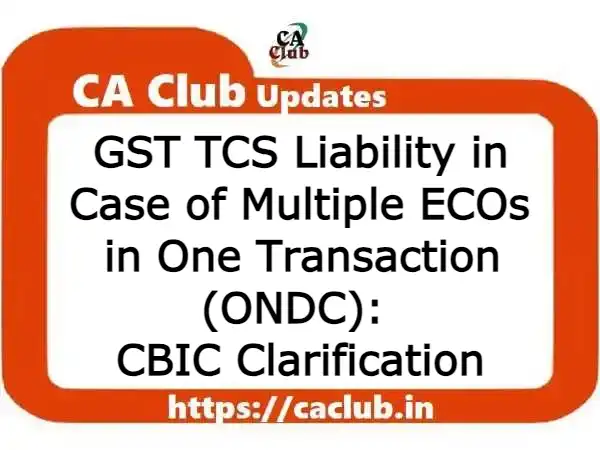The Central Board of Indirect Taxes and Customs (CBIC) has recently issued a GST Circular 194/06/2023 on July 17, 2023, providing clarity on the Tax Collected at Source (TCS) liability under Section 52 of the CGST Act, 2017. This clarification specifically addresses the situation where multiple E-commerce Operators (ECOs) are involved in a single transaction.
Background
The CBIC received several representations seeking clarification on the TCS liability when there are multiple ECOs involved in a transaction, particularly in the context of Open Network for Digital Commerce (ONDC) or similar arrangements.
Understanding the E-commerce Model
In the current platform-centric e-commerce model, a single ECO operates both the buyer interface and the seller interface. This ECO collects the payment from the buyer, deducts the TCS as per Section 52 of the CGST Act and credits the deducted TCS amount to the seller’s GST cash ledger. After deducting their service charges, the ECO then passes on the remaining consideration to the seller.
However, in the case of the ONDC Network or similar setups, there can be multiple ECOs involved in a single transaction. One ECO provides the interface to the buyer, while another ECO provides the interface to the seller. This raises questions regarding which ECO should be liable for TCS deduction and other compliances under Section 52 of the CGST Act in such situations. It’s important to note that both the buyer-side ECO and the seller-side ECO qualify as ECOs according to Section 2(45) of the CGST Act.
CBIC’s Clarification
To ensure uniformity in the implementation of the law across different field formations, the CBIC has provided the following clarifications:
Issue #1: Multiple ECOs Involved and Supplier-side ECO is Not the Supplier (Buyer >> Buyer-side ECO >> Supplier-side ECO >> Supplier)
In situations where multiple ECOs are involved in a transaction and the supplier-side ECO is not the actual supplier of goods or services, the liability for compliances, including the collection of TCS, rests with the supplier-side ECO. This ECO is responsible for releasing the payment to the supplier after deducting their fees/commissions. Consequently, the supplier-side ECO must collect TCS, as applicable and pay it to the government in accordance with Section 52 of the CGST Act. They are also required to fulfill other compliance obligations under the same section.
In this case, the buyer-side ECO is not obligated to collect TCS or fulfill any compliances under Section 52 of the CGST Act for that particular supply.
Issue #2: Multiple ECOs Involved and Supplier-side ECO is the Supplier (Buyer >> Buyer-side ECO >> Supplier also an ECO)
When multiple ECOs are involved in a transaction and the supplier-side ECO is also the actual supplier of goods or services, the responsibility for collecting TCS lies with the buyer-side ECO. The buyer-side ECO must collect TCS while making the payment to the supplier.
In this scenario, the buyer-side ECO must collect TCS, pay it to the government as per Section 52 of the CGST Act and fulfill other compliance obligations stated in the same section.
CBIC GST Circular 194/06/2023 dated 17/07/2023: Clarification on TCS Liability in Case of Multiple ECOs in One Transaction (ONDC)
Conclusion
The CBIC’s recent circular provides essential clarifications on TCS liability in situations involving multiple ECOs in a single transaction, specially in the context of ONDC or similar arrangements. These CBIC guidelines ensure consistency and uniformity in the implementation of the TCS law under GST. It’s important for businesses operating within the e-commerce space to understand their respective responsibilities and comply with the provisions of Section 52 of the CGST Act to avoid any legal complications.
|
Disclaimer: While reasonable efforts have been made to ensure the accuracy and reliability of the information presented in this article, it should not be considered as professional advice or guidance. For compliance, the readers are advised to directly refer to the relevant laws, regulations and notifications issued by the appropriate authorities. |

 CA Abhinav Aggarwal is a qualified Chartered Accountant and ICAI member since 2010. He holds vast experience in Audit, Income Tax & GST and is a passionate writer on the CA profession and related topics.
CA Abhinav Aggarwal is a qualified Chartered Accountant and ICAI member since 2010. He holds vast experience in Audit, Income Tax & GST and is a passionate writer on the CA profession and related topics.